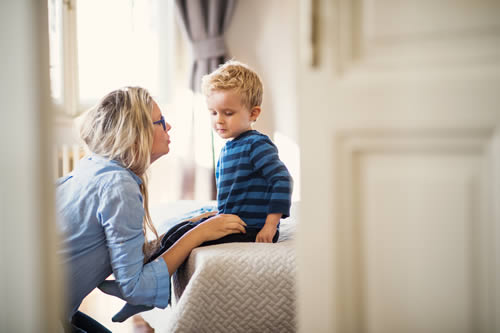Yvonne Newbold knows only too well how difficult it can be bringing up a child with special needs. Her son Toby was born with profound disabilities and spent most of the first few years of his life in hospital where specialists battled to help him with multiple problems. But as he got older and his physical health began to improve, his emotional stability began to deteriorate.
“His behaviour was off the scale,” Yvonne recalls. “He would smash up the house and someone was hurt every day. It was unbearable. People always blame mothers,” she continues. “They used to say I was being too soft or that I needed to be firmer. I tried everything but nothing worked and no-one knew how to help me.”
Anxiety the Root of Most Challenging Behaviour

After struggling for ten years – as a single mum raising two other children as well – she finally came across a professional who understood challenging behaviour. “They ‘got’ it,” she says, “and helped me to realise that Toby was suffering from anxiety. All behaviour is communication and he was screaming out for help and understanding. I loved him beyond anything but I wasn’t meeting his needs.
“‘Anxiety’ is a funny word,” she carries on. “People assume the anxious child is the quiet one at the back of the class but anxiety can be explosive, too. I think a better word is ‘fear.”
Having identified the reason for her son’s rages, Yvonne decided to change her approach. Like many young people with special needs, Toby’s fear led to controlling behaviour. For example, he expected his mum to have a new tape of children’s TV programmes ready for him to watch every day when he got home from school. However, if something went wrong with the TV or the tape, he would lash out, punching and kicking people and destroying equipment.
Feeling Safe is Key

“I realised that he felt safe if he could watch telly and that he didn’t understand that I was trying to help him,” Yvonne explains. “I started using the Makaton sign for ‘help’ and saying, ‘Does Toby need help?’ I did it for weeks with no change but at least I didn’t feel so helpless because I had a strategy. Slowly, he began to pause and give me two seconds to try to fix the TV and the pauses got longer.”
A year later, and after further research and a huge amount of painstaking effort, the young man who had needed three, strong adults to accompany him to the supermarket was able to attend his own eighteenth birthday party, along with two-hundred guests, and remain calm.
Further Setbacks
Tragically, a week after the party, Yvonne was diagnosed with terminal cancer. Unfazed – and to the astonishment of her doctors – she has gone on to spend the last decade supporting other families with challenging behaviour, earning an MBE in the process.
She started out giving talks in person but now runs online workshops for parents whose children have any kind of SEN. She covers a range of topics, inspired by the families she works with, such as improving self-esteem in SEN children, managing controlling behaviour, dealing with SEN meetings, and alleviating anxiety.
“I don’t want anyone else to go through what I did,” she comments. “Because I have ‘lived experience’, there’s trust. There are always tears in my workshops when people realise so many others are dealing with the same challenges. I worry that when the online sessions are finished, someone might be sitting at home by themselves, getting emotional. I tell people to e-mail me straight away if they need support.”
Parents Need to Look After Their Own Mental Health

Traditional parenting tactics won’t work with kids with SEN who have challenging behaviour, Yvonne advises. “Parents can feel frightened and out of control themselves and often, they’re not thinking straight,” she says. “If you try to get the child to obey you or impose sanctions, it’ll turn into a battle of wills, and you need to do whatever you can to avoid that. Put notes on your phone or stick something on the fridge, reminding you how to cope if your child kicks off. I used to have a piece of paper that said, ‘Remember that Toby is frightened too’. You also need to ask yourself, ‘How can I help myself feel safer and happier?’”
Yvonne’s workshops are open to anyone but she also has a Facebook group which is solely for carers of children with SEN who exhibit violent behaviour. The group has more than 12,000 members from all over the world.




